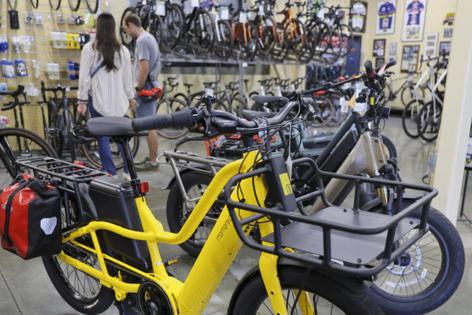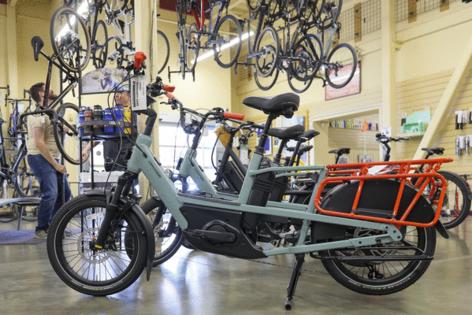Seattle eyes electric cargo bikes for greener deliveries
Published in Business News
SEATTLE — Ask any bike advocate how to fix any problem, and the answer comes quickly: more bikes.
When it comes to freeing up Seattle's valuable curb space, chipping away at its entrenched congestion and meeting its oft-repeated goal of reducing harmful greenhouse gases, the bicyclists may be right.
The Seattle Department of Transportation is considering new rules for electric cargo bikes, an effort it says will do all of the above, and more. In a city saturated with delivery vehicles and with little extra space, e-cargo bikes — which can carry upward of 800 pounds — may supply the last-mile delivery for the smaller parcels that come to our homes at nearly any time of day, reducing the number of larger delivery trucks on the street.
SDOT officials say greater use of e-cargo bikes could also speed up downtown deliveries, considering that 80% of commercial buildings in the city core rely on curbside deliveries. Their use could also make a dent in the city's carbon emissions, 58% of which comes from tailpipes, freight trucks the dirtiest among them.
The big crux of this is supporting our climate goals," said Katherine Rice, who helped devise Seattle’s e-cargo bike program as SDOT's electrification program manager, pointing to the city's 2030 goal of 30% of deliveries being done by clean vehicles.
The new regulations and permits for the bikes must still be approved by the City Council, which is scheduled to vote on the program Tuesday, and are expected to be in place by the end of the year. The proposal as it stands is similar to one adopted last year in New York City, the first major American city to authorize e-cargo bikes for delivery and freight.
Boston and Washington, D.C., are also considering adopting rules that mirror those in New York.
As in those cities, Seattle would authorize deliveries on electric bikes with two, three and four wheels. The bikes can be no wider than 4 feet, allowing them to ride in Seattle's bike lanes, which are typically 5 feet wide, and would be limited to 15 mph or less.
The ordinance also would redefine where cargo bikes with a valid permit can load and unload goods without additional cost, like in paid parking spots and neighborhoods with permit parking and time-limited areas. Many spots will be open to the bikes, but commercial, truck and passenger loading zones will remain off-limits.
Any licensed business can get a $100 e-cargo bike permit, which must be displayed on the bike, or a trailer pulled by a bike.
The city expects about 100 e-cargo bikes to be in use during the program's first year, a number that it anticipates will grow to 500 by 2030.
Giacomo Dalla Chiara, a research engineer at the University of Washington's Urban Freight Lab, said the program is a good first step that could help smaller businesses adopt the technology. But he said more needs to be done to spur adoption by established companies like Amazon and UPS — namely, building a bigger and better connected network of safe bikeways with the notion that a robust bike network would help larger companies see the benefit of cargo bikes.
"We still have huge highways, huge streets and not much infrastructure to support cargo bikes," he said. "Bikes are at a disadvantage, but it's an artificial disadvantage because our systems are made for cars."
A better bikeway network would also help the city avoid some of the pitfalls Dalla Chiara identified in a 2023 research paper published in the scholarly journal Transportation Research that collected and analyzed detailed data on the driving and parking behavior of Seattle-based cargo bike riders.
The study found that cargo bike delivery riders parked on the sidewalk 80% of the time, an unsurprising fact, considering that's where most bike racks are located.
Perhaps more surprising is that the cargo bicyclists rode on the sidewalk 37% of the time, compared with 55% on the roadway. Riding on the sidewalk primarily happened when the rider was making a delivery midblock or was riding against traffic on a one-way street.
Riders spent just 5% of their time in a bike lane. But when a road had a bike lane, riders chose it 49% of the time.
The study also looked at traditional parcel delivery drivers who relied on cars and trucks. While bike riders spent more time moving — 40% of the time, compared with 20% of the time for drivers — they spent far less time looking for parking and being parked. Those activities gobbled up 80% of the time for drivers.
Overall, the average trip time per parcel for a cargo bicyclist was 2.2 minutes. For a driver, it was 6.2 minutes, showing the disadvantage of having to navigate and park a large vehicle in a congested area.
Dalla Chiara, who has worked with SDOT before on e-cargo bike issues but not on the recent effort, said the city should incentivize their use rather than charge for a permit, which he said might discourage companies from using the bikes.
Seattle has been working on its latest effort to encourage and regulate e-cargo bikes since 2022. But projects to try the technology go back further, including a pilot project in 2018 that let UPS test a new e-bike delivery system downtown.
Currently, there aren't a lot of examples of their use.
Pagliacci Pizza has used them at its Capitol Hill location since 2022 to deliver more than half its pies — about 800 a month. The location, one of the local chain's 24 pizzerias, is particularly suited for bike delivery due to its small, densely populated delivery area, said Jeff Woodruff, the company's chief operating officer.
"Our e-bike riders are more efficient than car drivers," Woodruff said. "They can just zip by the backup on Boren, for example. There's not a lot of limitation to what they can do. It's pretty impressive."
The e-bikes are part of Pagliacci's broader initiative to reduce its emissions, which includes the use of electric cars. A Redmond location opening in November will also have e-cargo bikes, Woodruff said.
Another example is the Seattle-based Cascade Bicycle Club's Pedaling Relief Project. Volunteers and their e-cargo bikes deliver food from local grocery stores to four local food banks. Since the project's inception in 2020, it has delivered more than 1.5 million pounds of food and is an example of "the movement of goods through the city in a cleaner, greener, timelier, safer, and more affordable and efficient manner, said Paul Tolmé, the club's spokesperson.
Still, e-cargo bikes have a ways to go before replacing the vast logistical operations of Seattle.
For instance, according to a 2023 article on the industry news site Supply Chain Dive, one DHL facility in Seattle — the Express Service Center, which handles the company's most time-sensitive packages — has a 60-truck fleet that moves 4,000 shipments a day.
Maybe soon it'll have an e-cargo bike or two to get where no truck can go.
©2025 The Seattle Times. Visit seattletimes.com. Distributed by Tribune Content Agency, LLC.















Comments